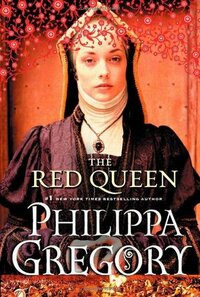Take a photo of a barcode or cover
sad
medium-paced
Plot or Character Driven:
A mix
Strong character development:
No
Loveable characters:
No
Diverse cast of characters:
No
Flaws of characters a main focus:
Yes
Gregory will always be a guilty pleasure for me. Especially when she chooses subjects like Margaret Beauforte. A fanatic in a lot of ways. Will argue the sky green if she believed it. Not always likable and not always understandable. But a woman to change history.
Can't wait to read the next one. Love her style and the way she weaves a story around the history.
3/5
I enjoyed this book much more that the white queen, and found that it flowed much better. Surprisingly, I was also way more invested in Margaret than I was In Elizabeth when reading the previous book. I expected to hate her in every aspect but Gregory does a great job of showcasing the different sides to her and why she is the way she is. My main downside from this book was that she seemed to do a lot of ‘telling not showing’, and there were lots of times where I wished to know more about what Margaret may have been feeling at the time, how those things effected her, and we’d just jump to the next thing. Some may find this better as they can draw their own conclusions, but I would have liked if she had been fleshed out a bit more. Overall fairly good book, and I think much better than the white queen.
I enjoyed this book much more that the white queen, and found that it flowed much better. Surprisingly, I was also way more invested in Margaret than I was In Elizabeth when reading the previous book. I expected to hate her in every aspect but Gregory does a great job of showcasing the different sides to her and why she is the way she is. My main downside from this book was that she seemed to do a lot of ‘telling not showing’, and there were lots of times where I wished to know more about what Margaret may have been feeling at the time, how those things effected her, and we’d just jump to the next thing. Some may find this better as they can draw their own conclusions, but I would have liked if she had been fleshed out a bit more. Overall fairly good book, and I think much better than the white queen.
Rated 3 stars because of my intense dislike for Margaret Beaufort. What a little cancer she was.
informative
tense
slow-paced
Plot or Character Driven:
A mix
Strong character development:
No
Loveable characters:
No
Diverse cast of characters:
No
Flaws of characters a main focus:
Complicated
fast-paced
I was surprised, but I actually ended up liking this novel a shade better than "The White Queen". There's much less of the Melusina magic, which I really felt was used too much as a deus ex machina in "The White Queen". The relationship with Jasper Tudor, although completely fictional, was intriguing and even more so because I knew it could never truly be realised. The one-liners here and there. I actually liked Margaret's steadfastness and singlemindedness, and whilst her ruthlessness is shocking to modern sensibilities at the same time I didn't feel like it was out of place in the brutal Medieval world in which Margaret moved. At points, Margaret is downright mean, however whilst I didn't like her mean actions I could still understand what drove her to them, the pride and jealousy that she harbours.
That said, the book had its problems. One problem was the sheer repetition. This seems to be a consistent problem throughout many of Gregory's books – Elizabeth Woodville has her legend of Melusina, Mary Queen of Scots has her "I am three times a queen", Catherine Howard has her "Let me see, what do I have now"... Margaret Beaufort has an obsession with Joan of Arc. Gregory seems to lack the necessary skill to create a character’s personality through subtle means, through showing instead of telling, because she seems to hit upon one phrase or theme to associate with a character and then repeats it over and over again throughout the novel. Margaret Beaufort was a pious woman, we know this from history. Gregory feels the inexplicable need to demonstrate this by giving her character an obsession with Joan of Arc, and then repeatedly drumming this into us throughout the book. However, her readers aren’t stupid and don’t have the attention span of a goldfish – yes, we got it the first time, she likes Joan of Arc because she’s so pious, we understand this – and such interminable repetition gets extremely old extremely fast. Give your readers a little credit and stop repeating things like this. It makes the story drag for us as readers, and it makes you come off like an incompetent writer because you’re telling, not showing. Moreover, the Joan of Arc stuff isn't the only repetition you'll encounter in the book. Characters who should be on close terms with one another call each by full name and title, just in case we've forgotten who they are for the past 100 pages or so.
Occasionally some spelling and grammatical errors have crept in - which wouldn't be worth mentioning except they unfortunately change the meaning of the whole sentence - and here and there I stumbled across some strange sentences which just sounded clunky and poorly constructed, though this is not the first time I've noticed this in Philippa Gregory's works.
The novel is written in first person from Margaret Beaufort’s point of view, which can also be a problem at times, as it was in "The White Queen". Since many of the battles occur outside of Margaret’s experience, Philippa Gregory is rather stuck, unless she wants to write a string of messenger scenes, which would be authentic but fairly dull for us as readers and mean that we would have no action whatsoever throughout the novel. Instead, Gregory switches out to third person omniscient perspective for a single scene here and there whenever she needs to write a battle, returning to Margaret’s first person POV again afterwards. This feels really awkward, since we’re meant to be following Margaret’s story here. I felt like Gregory should have chosen a perspective and stuck with it all the way through. Personally I think third person works best for historical fiction, since it covers so many events that one person alone is rarely present at for all. If she wanted to do first person in order to give us an intimate portrait of Margaret, fine, her decision, but stick with it – otherwise we can’t really get a true insight into Margaret unless we’re with her all of the way, experiencing what she experiences and missing out on the battles she misses, waiting at home like her with nervous anxiety and waiting for news of the battle’s outcome.
However, probably my biggest gripe with this book was the fact that Gregory never comes to grips with the real meat of the history. This is actually a complaint about all of her books as this is another feature which plagues her writing consistently. The historical events feel glossed over with a broad brush and largely trivialised, reduced to a ten person cast and all the social complexity of who is friends with whom, ignoring the wider picture and the larger issues behind conflicts. Many of the momentous events which make up the most exciting happenings of whichever period Gregory is writing about are related in past tense and they occur offstage, and we are told about them in a sentence or two. This is a huge let down as a reader, as these moments are the turning points of their day, exciting events of truly huge significance. Instead of writing these moments out as actual scenes, happening live and unfolding before our eyes as we read with baited breath, utterly engrossed, Gregory tells instead of shows and plops down a summary of what happened, which we don’t get to see, and uses it as exposition to move the plot forwards to the next scene. To illustrate this, I’ve provided a couple of examples from this book. This first example comes from page 182 of the edition I read (no spoilers, this is known historical fact):
"Amazingly, Edward gets to London without a single obstacle in his path, the gates are thrown open for him by the adoring citizens, and he is reunited with his wife, as if he had never been chased from his own land, running for his life."
Above, Gregory, using Margaret as a narrator, describes the return of Edward IV from a rebellion which forced him into exile from England and was probably the darkest and most uncertain period of Edward’s reign. Yet, Gregory summarises them in a single sentence which glosses over all this, and worse it all occurs offstage and we never get to see any of these thrilling events! Again, if she’s going to stick with Margaret as a first person narrator, she is in some difficulty in conveying these events, certainly, which is why I think third person is better for historical fiction, but the very least she could have done was let these events play out "live" through Margaret’s eyes from afar. This isn’t just a one off example either. The following quote comes from page 255 of the edition I was reading:
"News comes in snippets from the outside world, carried by housemaids as gossip from the market. Richard declares that the marriage between the queen, Elizabeth Woodville, and King Edward was never valid as Edward was pre-contracted to another lady before he married Elizabeth in secret. He declares all their children bastards and himself as the only York heir. The craven Privy Council, who observe Hastings’ headless body being laid to rest beside the king he loved, do nothing to defend their queen and their princes, but there is a general hasty and unanimous agreement that there is only one heir, and it is Richard."
Richard’s seizing of the throne is covered in three sentences, again conveyed in past tense as an event which happened offstage. This is the seizure of the throne we’re talking about, this should be one of the highlights of the novel and you should be able to squeeze multiple scenes and pages out of this, all jam packed with tension and excitement. What do we get? Nada. Nothing. A summary that greatly simplifies and glosses over events.
The biggest disappointment of all is the Battle of Bosworth Field. Here Gregory finally has to bite the bullet and write it in real time in order to give her story some sort of climax... but it’s covered in under five pages – of pretty large font and double spaced at that – and the whole thing feels quite trivial and basic. I didn’t get the sense of the epic scope of what was going on, and the scene for me failed to conjure or evoke any sort of atmosphere or ambience, and finally the tactical manoeuvrings just weren’t described very well and came off as all too simplistic and easy. After it was over I couldn’t quite believe that Gregory had written such a dull, lifeless, lacklustre retelling of the Battle of Bosworth Field, so much so that I felt compelled to immediately pick up my copy of Sharon Penman's "The Sunne in Splendour" and turn to its account of the battle, just to confirm in my mind that it was actually possible to write a better retelling of it than this. What I felt was overwhelmingly disappointment that such a great historical moment, on which virtually everything hinged for the two opposing leaders, could be so thoroughly screwed up. How can you screw up writing the Battle of Bosworth Field? It’s got all the tension and excitement you could ever hope to ask for in an historical event!
I so wanted to give this book 3 stars out of 5, as there were a number of things about it which I did like and enjoy, but I have to concede that the number of problems outweighs the good points, meaning I can't in all honesty give it more than 2 stars... but just barely. If there was an option to award half stars I might well be using it right now. Even though I so wanted this novel to be better than it was, let's face it, in the end this is lightweight historical fiction, this is the Wars of the Roses Lite.
adventurous
challenging
dark
emotional
informative
tense
Loveable characters:
No
Diverse cast of characters:
No
adventurous
emotional
relaxing
tense
slow-paced
Plot or Character Driven:
Plot
Strong character development:
No
Loveable characters:
No
Diverse cast of characters:
No
Flaws of characters a main focus:
Yes





